- Home
- Gail Carriger
Funny Fantasy Page 5
Funny Fantasy Read online
Page 5
It had seemed like a good idea at the time. He wanted to go from here to there, but there were rumors of brigands and boogens and marauding disobeyers of civil authority and . . . and he had little to no ability to defend himself or, frankly, anything or anyone else.
After all, back when he was known as Corey the Comedian, working bars with a traveling troupe of performers, he had never needed fighting skills and he had never feared the open road. The troupe's manager always hired itinerant warriors to protect the players and their wagons full of costumes, props, and magic items. Consequently, neither he nor any of the various actors, comedians, or attractive and comely dancers and singers had any worries of ambush or other unseemly encounters. Indeed, one of the ways he had convinced his mom to let him go on the open road as a teenager years ago was that he promised always to use protection.
"No worries of ickiness," he had intoned. He'd always had a way with words.
Unfortunately, even though he was well protected in his travels by moonlighting city guards and heroes for hire, he was not quite so well protected from the vagaries and vicissitudes of life. In short, his career had not flourished. He was, he had been forced to admit after constant and rude reminders from his dwindling audiences, a not-particularly-funny comedian. The manager of the troupe had not only noticed this vocational flaw, he had joined in the heckling. Corey could live with that, but when the manager "forgot" to mention once that the troupe was leaving town early the next morning, Corey had taken it as a possible indicator that he was not indispensable to the troupe's performances.
Corey had, of course, wished to stay with the troupe and did his best to help in other ways, but he did not have a good enough memory to transform himself into a teller of epic tales and was insufficiently coordinated to become a juggler. He had tried to sing a time or two, but really wasn't fond enough of vegetables to continue that particular career path. He was useless, even behind the scenes. He couldn't remember what props went where and nobody liked his cooking, including him.
When you came right down to it, Corey was only part of an itinerant troupe of players because he liked staying up late and hanging around bars. In the end, he was reduced to playing the part of any corpse that was needed in the group's various dramatic performances. Even this was problematic, as he had an unfortunate tendency to squirm uncontrollably when he lay on his back too long. It was in an attempt to improve his corpse portrayals that he discovered his new calling.
He convinced a mage who was riding the same circuit of miserable hamlets and villages as his troupe to teach him a magical spell that allowed him to feign death. Magicians, of course, don't like to give out their secrets, but feigning death is not really one of those "wow" spells that everyone clamored to know. Corey was sufficiently adept or appreciative or, perhaps, annoying that the magician, Magnifico the Magnificent Mage, went on to teach him a few more of the lesser spells.
His change in profession was just in the small, bleeding gash of time, as Corey was fired just a fortnight later . . . or, at least, the troupe moved out to another, undisclosed town under the cover of darkness, without him being informed.
That's how he came to be traveling alone to the west while the troupe and its mercenary guards traveled east . . . or north . . . or south . . . or southeast . . . or north-northeast . . . or some other direction, for all he knew. No one was talking. Even the street urchins and panhandlers had apparently been paid off.
Having been spurned by the troupe, Corey decided to take his magic act on a solo tour of the smallest and least sophisticated hamlets and hovels he could find. His new moniker was Corbinico the Comedic Conjurer. Of course, in a fortnight, he had not learned much magic. And, in a decade, he had not learned much comedy. But he believed that he had learned just enough spells and just the right spells to punctuate his otherwise uneven comedic monologue and amuse an audience of simple folk with simple minds and not enough wealth to waste vegetables as projectiles.
He could make someone hear a whisper. He could make someone sneeze or make them itch in an embarrassing spot. He could give someone a bit of a zap—causing pain, but not really much damage. He could untie simple knots, no matter how tight, without using his hands. And he could feign death.
Not really much of a routine, but he would work that out as he walked. All he had to do was get to the farm country, where the roads were safe and the inhabitants guileless. The immediate problem was that his magical abilities did not provide much in the way of offensive or defensive fighting power and the road west to the farmlands was risky.
That's why he needed protection.
That's why he decided to travel with the barbarians. He didn't have the money to hire professional, or even semi-professional, guards. But he figured if he just traveled along with the barbarians, he would be safe. They were known as fierce fighters, especially when attacked from downwind. They were skilled with the various blood-encrusted bladed weapons they carried with them, they were too stupid to retreat, and they generally carried no treasure worth stealing.
That made them the perfect companions for a lone traveler seeking protection, except, of course, for the stench, the lack of intelligent conversation, the inedible trail food, and the lack of any rest stops along the way. (Horses peed while they walked; why should barbarians do any different?)
Oh, and the fact that barbarians hate magic and will kill a magician without a moment's thought should they run across one.
Corey wasn't stupid, just unemployable, so he omitted mentioning that he was a magician when he conversed with his would-be companions about their upcoming travels. It was pretty easy to avoid the topic. The conversation went something like this:
"We go toward setting sun. Go far," said Torg, the largest and smelliest of the breed. Torg had one bright blue eye and one green eye that was clouded over and oozing pus.
"Me go with you," said Corey, stifling a gag. "Be friends. Share food. Be strong,"
Torg looked him over and said something rude to Barack and Kindo, his two lackeys and partners in slime. "You little. No strong. We eat food yours. We be strong. We go toward setting sun."
"Yeah, whatever," said Corey, smiling broadly and nodding like an idiot.
IT ALL MIGHT have worked out alright, traveling west together, with the brute barbarian beasts not knowing of Corey's magical proclivities, if Corey's troupe hadn't also traveled west . . . and left a squad of professional mercenaries behind to make sure that Corey didn't follow. That might have made for considerable excitement and gratuitous bloodshed, except for the fact that barbarians are so fierce, they don't think they need to set a watch for the night.
Instead, as the dawn rose in the east, Corey, Torg, Barack, and Kindo woke-up . . . well, gained consciousness . . . each with a large lump on his head. Each was tied firmly to his own tree trunk, his face turned toward the burning rays of the sun. After the appropriate amount of confusion, swearing, straining ineffectively at their bonds, and finger-pointing (without actually being able to use fingers), a sullen silence set in. The foursome actually might have stayed in such position for some time, but the barbarians let loose with their morning pee and Corey was downwind. Something snapped and he did something incredibly useful and stupid.
He muttered a few magical phrases and the ropes tying them to the trees began to untie themselves.
Each of the constituent members of the barbarian horde (any group of two or more barbarians technically qualifies as a horde, etymologically speaking, though there is some dispute as to whether the term "horde" actually is an abbreviation for the word "horrid") looked at the ropes, then looked at Corey, then looked at one another, then looked at their weapons piled next to where the campfire had been, then looked at Corey, then smiled (not in a friendly "thanks for the help, good buddy" way, but in a drooling, toothy "I get his intestines" kind of way), then tried to engage in what appeared to be a barbarian variant of rock-paper-scissors, except that they couldn't see each other's hands, so Torg just growled and the others looked down (
as if to agree that he not only got the intestines, but the brain as well).
Things didn't look good. The pee-soaked, battle-lusting barbarians certainly didn't look good. And Corey, what with being knocked out and tied to a tree and not having had an opportunity to take care of his morning biological functions, and being so concerned about being sliced in half that he was about to imitate the barbarian peeing-on-oneself practice, he didn't look so good, either. Here he was, about to be killed for being a magician and he was barely even a magician apprentice wannabe, who had cast less than a half-dozen miserable, puny little spells in his entire adult life. It wasn't as if he was a threat to the barbarian horde, or all barbarian hordes, or their women, or, more importantly, their goats. It's not like he was the most powerful mage in all the world. Of course, they didn't know that.
Of course! They didn't know that.
Corey extricated himself from his loosening bonds and leapt between the group of three barbarians, still in the midst of stepping out of their now-untied bonds, and their trusty, crusty weapons. He took up an exaggerated fighting/casting stance that he had seen one of the more flamboyant actors use in a performance of The Veiled Threat of Seven Parts and, in the deepest voice he could muster, shouted: "I am the greatest magician in all the world. I am Corbin the Conqueror. I have the power of Life and Death in my hands."
Well, that started a lot of barbarian yammering and various slit-eyed looks as the horde either discussed his claim or tried to figure out what the hell he was saying. Finally, Torg pushed Barack forward. The barbarian underling began to edge toward Corbin the Conqueror and the stash of weapons behind him.
"Death will come to you," shouted Corbin, looking sternly at the more tremulously trepidatious than intrepid tribesman before uttering a few arcane phrases. The words "Death, death, death will come to you," whispered in Barack's ear. The barbarian lackey backed off, twisting about like a dog chasing its tail to see who or what had whispered in his ear until he got dizzy and fell down.
Kindo made a minor move next, but yet another muttering by Corbin caused the maneuver to abort, as Kindo grabbed at his suddenly itching privates, even more than he had the night before.
Torg spat at the ground in disgust, then pushed his underlings to either side, and strode forward, as manfully as one can with urine-soaked goat skin breeches. "You no strong. Torg strong."
"Fair warning," sneered Corbin. "I have the power of Life and Death in my hands." He gazed quickly about the sky and saw a buzzard lazing overhead, no doubt waiting to get in on the leftovers of any violent encounter. Corbin pointed at the bird. "I show you."
With as much showiness and force as he could muster, Corbin gesticulated broadly and shouted magical phrases in basso profundo, ending with his hands and his eyes pointed straight at the innocent scavenger. "Death to you," added the magician, as his minor zap spell sprang from the tips of his stubby fingers heavenward toward the unsuspecting fowl.
The bird screeched in pain and fell from the sky, dead (maybe from the zap or maybe from the fall; Corbin wasn't picky, he was just grateful).
Corbin smirked crookedly and looked Torg straight in the eye (the blue one). "I can do that ten thousand times a day." He waggled his little finger to discharge the static that always clung after a 'zap' spell, sending a minor spark into Torg's snot-encrusted nose. "Do not anger me, puny one. I am the most powerful mage the world has ever known."
The barbarians bought it, muck, slime, and stinker. Their eyes widened, then cast downward. They fell to their knees. They wrung their hands in supplication. They bowed in obeisance. They quivered in fear when they weren't quavering in awe.
The trip went much better after that. They rested when Corey wanted them to rest. They allowed him to walk where he wanted (upwind). They offered him the largest, moldiest portions of what he was sure they believed were fine cheeses. They even bathed, at his direction, in a river-rapids they were crossing, scouring away months of grime and replacing their usual stench with the smell of wet goat-hair, at least for awhile.
Corbin almost thought things would work out until it came time to camp for the night. Oh, the horde was obedient and helpful: stoking the fire; cooking up fish for him that they usually ate raw (without cleaning them first); mounding up dry grass for a mattress; and more. But Corbin saw the gleam in Torg's good eye (he avoided looking at the pus in the bad eye) and realized that the barbarian would come for him in the night (and not in the "gee, we don't have any goats here" way). Suddenly, things looked a lot darker, and not just because the sun had set.
Corbin was right. At the darkest hour, Torg came for him. Corbin couldn't see him, of course. There was no moon. But he could smell him. So he did the only thing he could do when faced with a superior fighting foe. He leapt up, screamed like a little girl, tried his best to duck as he heard the swish of a weapon aimed for him, and collapsed to the ground, feigning death.
In case you've never tried it, feigning death is pretty cool . . . especially to the touch. You can hear and see and smell normally, but you appear to be completely dead. No pulse, no apparent breathing, no reaction to stimuli. Skin cold and clammy. Corbin worried a bit that Torg might mutilate his corpse in rage or celebration, but the brute only nudged him a few times with a heavily-calloused toe with a frighteningly long toenail.
Torg hooted in victory, waking both of the rest of the horde, and jumped up and down a few times. Then he clapped his companions on the head for being inferior to their fearsome leader and everyone went to sleep. Corbin dozed himself.
The horde was just about to decamp the next morning, when Corbin calmly canceled the spell and sat up, refreshed and unharmed. He looked squarely at Torg. "I hold the power of Life as well as Death. The next time someone from your tribe kills me, I will rise again and kill not only you, but all of your women . . . and all of your goats."
And, so it was that Corey the Comedian became the God-King of the barbarian horde (I mean the full horde; not just the three guys he had traveled with). Torg became the high priest of the acolytes of Corbin, the Conqueror of Life and Death. Barack and Kindo carried Corbin around in a litter. He was fed the best goat and the best berries and offered the best women the barbarians had to offer. Life was good. And Corbin didn't just take advantage; he was an enlightened leader who instituted wise policies, like cooking fish and peeing in the bushes instead of on oneself.
For quite a few months, it seemed as if it really had been a good idea to travel with barbarians.
And then came the armed legions of the king.
Soon, and apparently for the rest of their lives, the horde was surrounded by ten thousand armored soldiers, a force that had been assembled to rid the kingdom of the pestilent scourge of the barbarians. And everyone in the horde, every man, woman, and goat, looked to Corbin and cried in unison the phrase he had used at the beginning of every speech, every judicial pronouncement, every greeting he had ever made since becoming the God-King of the Horde: "I am Corbin, the Conqueror of Life and Death. I can kill ten thousand times a day. And I can rise from the dead to do it again tomorrow."
You have to admit, it's a good line. But, of course, that's what the horde was looking for him to do. Kill ten thousand times. The king's legion, of course, had no such expectation. Accordingly, the knights bugled their charge, lowered their lances, and came at the tribesmen. The horde didn't even bother to pick up their weapons, such was their faith in Corbin the Conqueror . . . their stupid, misguided faith.
It was going to be a slaughter.
Suddenly, traveling with barbarians didn't seem like it had been a good idea after all. So Corbin did the only thing he could do.
He feigned death.
Maybe Corey the Comedian could entertain the troops after the slaughter.
This story originally appeared in the Fantasy Gone Wrong anthology, DAW, 2006.
Donald J. Bingle, the world's top-ranked player of classic role-playing game tournaments for fifteen years, is the author of five books and about f
ifty short stories in the thriller, horror, fantasy, science fiction, mystery, steampunk, romance, comedy, and memoir genres. Many of his previously published stories are reprinted in his Writer on Demand series, including: Tales of Gamers and Gaming; Tales of Humorous Horror; Tales Out of Time; Grim, Fair e-Tales; Tales of an Altered Past Powered by Romance, Horror, and Steam; Not-So-Heroic Fantasy; and Shadow Realities. His latest novel, The Love-Haight Case Files, co-authored with Jean Rabe, is, according to New York Times best-selling author William C. Dietz, "... a comedy, locked within a mystery, hidden in a horror story... Wonderfully clever, stylish, and ghoulish. Delightfully twisted fun!" More about Don and his writing can be found at www.donaldjbingle.com.
A Fish Story
Sarah Totton
IN THE VALE of Brecon where the fishermen hunt their game amid deep and succulent cloud, where the yaks are pink, and where the maidens are all beautiful (with some exceptions) lived the grand old dowager, Lydia Batterfly.
Lydia Batterfly's greatest regret in life was her niece, Dagmar. Dagmar was neither inclined toward the practice of womanly etiquette, nor suffiently attractive to be forgiven her disinclinations. Despite attendance at finishing school for two full years, she stubbornly refused to act like a lady. Worse was her tendency to make a spectacle of herself over the most inappropriate things, most recently and deplorably "that awful tower boy," as the dowager Batterfly referred to him.
"I don't know why you bother with him," said the dowager.
"His name is Henry," said Dagmar, "and I bother because he is superb."
"Not by our standards," said Lydia, by which she meant the standards of any sensible woman of good breeding and taste.
Henry, the bell tower boy, was nearly seventeen with limbs as long as a spider monkey's and hair so short it barely colored his scalp. He went about town in simple white clothes, displaying no familial colors—the shameful apparel of a bastard. Henry's job was to climb the tower and play the fish until their echoes rang from the valley walls. There were five fish in the tower, caught from the Sonorous River, in the days when fish swam in rivers, by one Martidel Bayliss, the greatest fisherman in Brecon history. His enormous catches had been bronzed for posterity and hung in the tower where they were twice daily made to clatter amongst themselves in a semblance of music. Henry, the current bell tower boy, was recognized as one of the better practitioners of the art of fish-clattering. Dagmar had been in love with him from the moment she'd first seen him, trousers rolled up to his knees in the Friday Bog with a frog clutched in his fist, squeezing it just hard enough to make its eyes protrude.

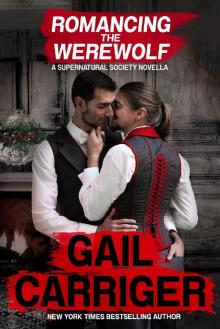 Romancing the Werewolf
Romancing the Werewolf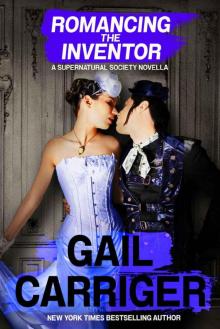 Romancing the Inventor
Romancing the Inventor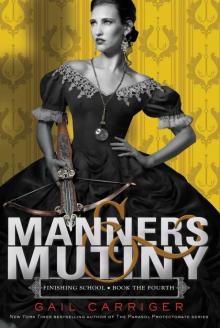 Manners & Mutiny
Manners & Mutiny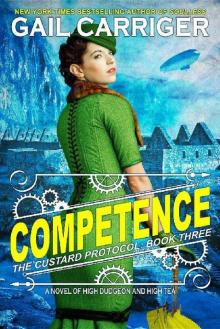 Competence
Competence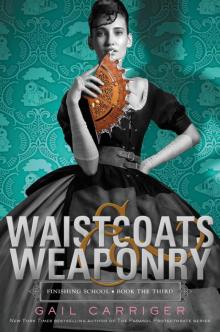 Waistcoats & Weaponry
Waistcoats & Weaponry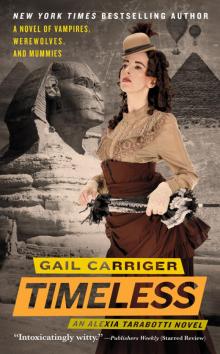 Changeless
Changeless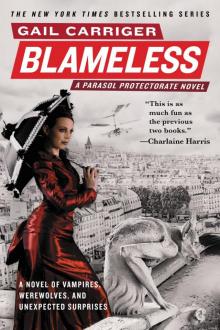 Blameless
Blameless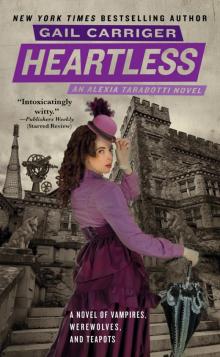 Soulless
Soulless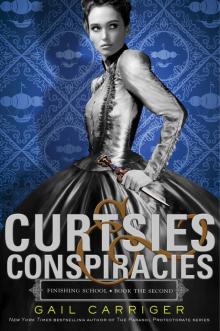 Curtsies & Conspiracies
Curtsies & Conspiracies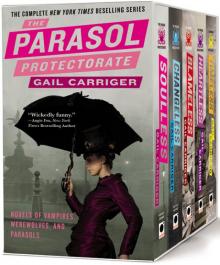 The Parasol Protectorate Boxed Set
The Parasol Protectorate Boxed Set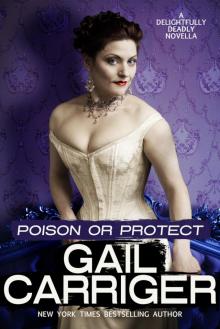 D2D_Poison or Protect
D2D_Poison or Protect Funny Fantasy
Funny Fantasy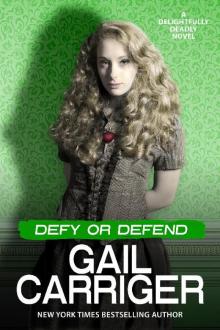 Defy or Defend
Defy or Defend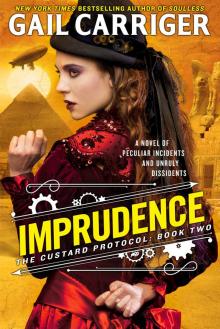 Imprudence
Imprudence Reticence
Reticence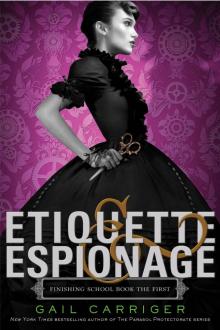 Etiquette & Espionage
Etiquette & Espionage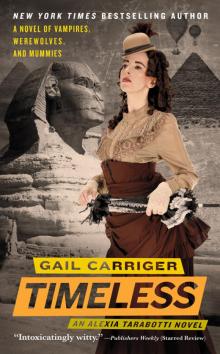 Heartless
Heartless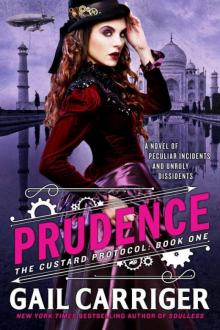 Prudence
Prudence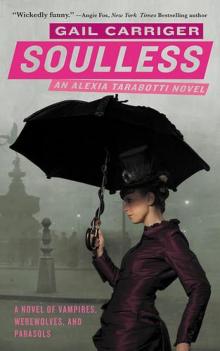 Parasol Protectorate 01 - Soulless
Parasol Protectorate 01 - Soulless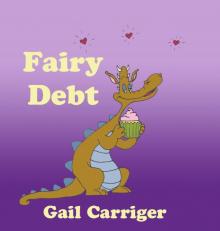 Fairy Debt
Fairy Debt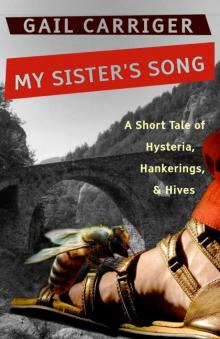 My Sister's Song
My Sister's Song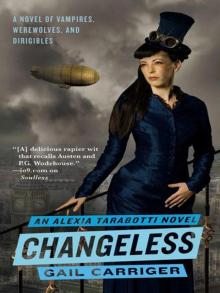 Changeless: The Parasol Protectorate: Book the Second
Changeless: The Parasol Protectorate: Book the Second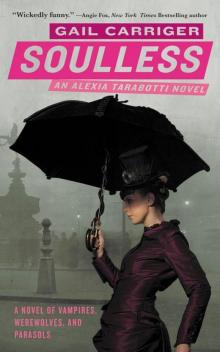 Soulless: The Parasol Protectorate: Book the First
Soulless: The Parasol Protectorate: Book the First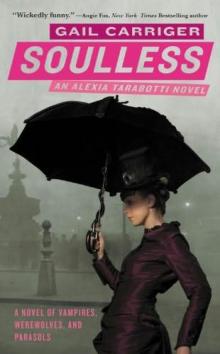 Soulless pp-1
Soulless pp-1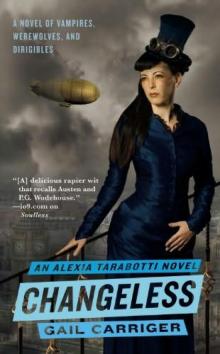 Changeless pp-2
Changeless pp-2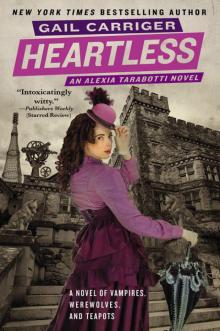 Heartless: The Parasol Protectorate: Book the Fourth
Heartless: The Parasol Protectorate: Book the Fourth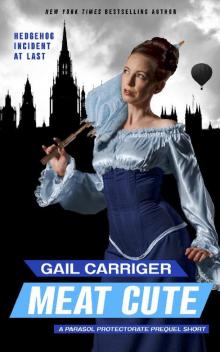 Meat Cute
Meat Cute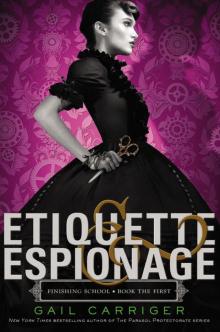 Etiquette & Espionage (Finishing School)
Etiquette & Espionage (Finishing School)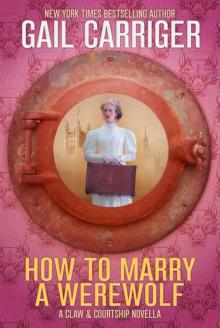 How To Marry A Werewolf (Claw & Courtship Novella Book 1)
How To Marry A Werewolf (Claw & Courtship Novella Book 1)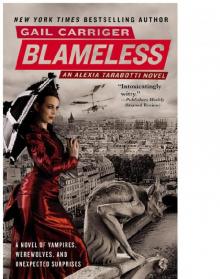 Blameless: The Parasol Protectorate: Book the Third
Blameless: The Parasol Protectorate: Book the Third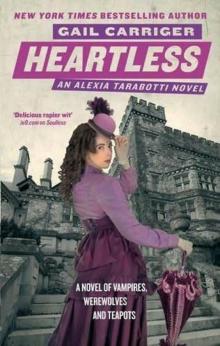 Heartless pp-4
Heartless pp-4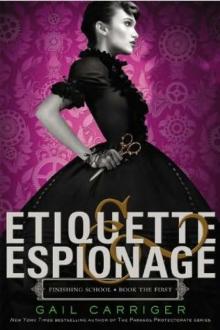 Etiquette & Espionage fs-1
Etiquette & Espionage fs-1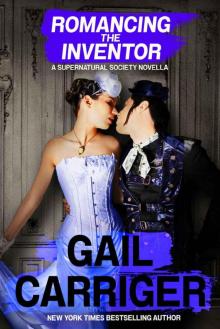 Romancing the Inventor: A Supernatural Society Novella
Romancing the Inventor: A Supernatural Society Novella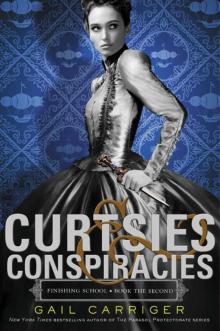 Curtsies & Conspiracies fs-2
Curtsies & Conspiracies fs-2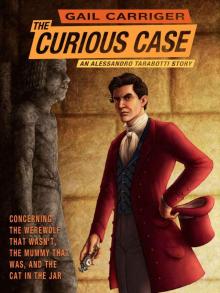 The Curious Case of the Werewolf That Wasn't, the Mummy That Was, and the Cat in the Jar (The Parasol Protectorate Book 6)
The Curious Case of the Werewolf That Wasn't, the Mummy That Was, and the Cat in the Jar (The Parasol Protectorate Book 6)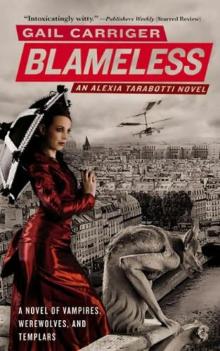 Blameless pp-3
Blameless pp-3